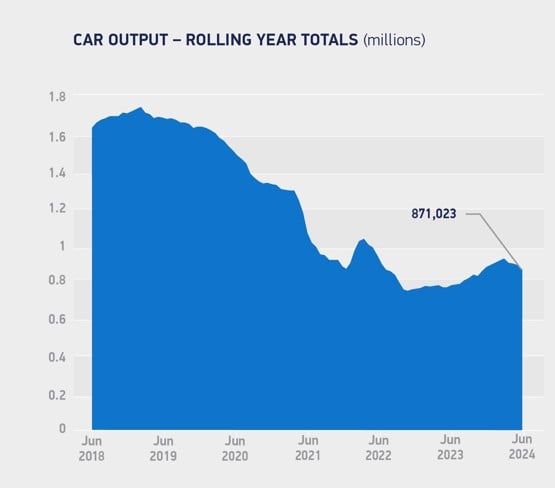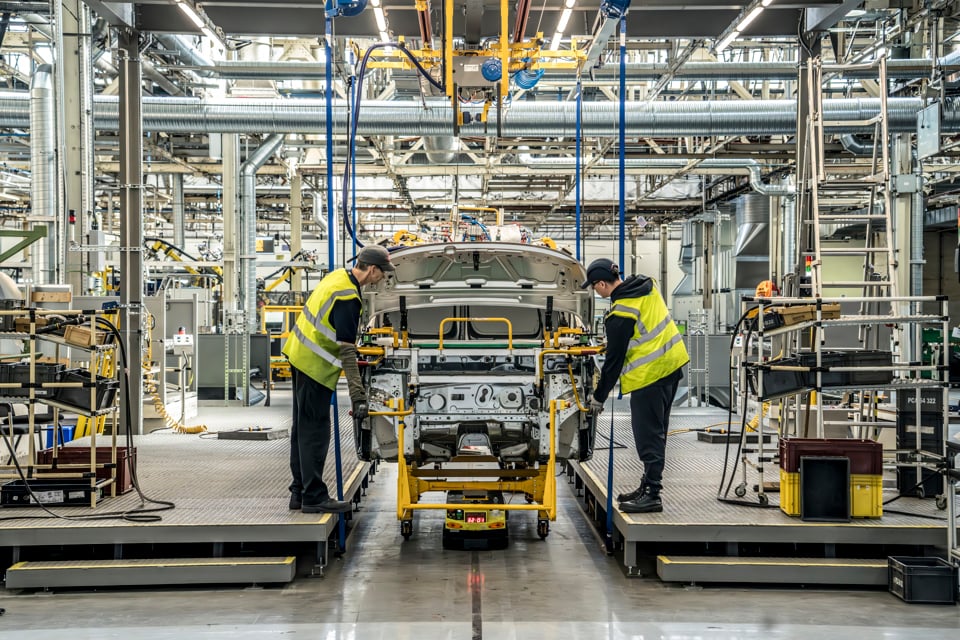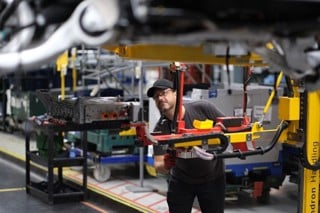UK car production fell by 7.6% in the first half of 2024, as manufacturers retool lines to make electrified models.
According to figures from the Society of Motor Manufacturers and Traders (SMMT), factories turned out 416,074 units - 34,094 fewer than in the same period in 2023.
Production declined by 26.6%, in June, caused by multiple model changes.
The dip in performance was expected following more than £23 billion of UK investment in factories to produce electric cars.
UK light vehicle production is now expected to decline by 9.3% this year, to around 910,000 units. Output is then set to recover to around 1.1 million units in 2028 when more than half of all UK car and van production is expected to be zero emission, and reach some 1.167 million by the end of the decade.
Amid this transition, first half year electrified vehicle (battery electric, plug-in hybrid and hybrid) production was down 7.6%, in line with overall volumes, to 157,224 units. This represents more than a third (37.8%) of all output, unchanged from last year.
In the same period, overall car output for the UK market was up 17.7% to 106,157 units, but this was not enough to offset a 13.9% decline in production for export, with more than seven-in-10 cars made destined for customers overseas.

Mike Hawes, SMMT chief executive, said: “The UK auto industry is moving at pace to build the next generation of electric vehicles – a transition that can be a growth engine for the entire British economy.
“The new government’s commitments to gigafactories, a decarbonised energy supply and a faster planning system will help boost our competitiveness and sustain employment in a sector that delivers well paid, skilled jobs nationwide. Amid fierce global competition, however, industry and government must work quickly to deliver those commitments, creating an industrial strategy that enables the growth the economy craves.”
The EU remains the most important market for UK car makers, taking 55.4% of all exports in the first six months, equivalent to 171,745 units. The US, China, Turkey and Australia made up the rest of the top five export locations, accounting for a combined 29.4% of all overseas orders. Japan, Canada, South Korea, UAE and Switzerland completed the top 10.

Richard Peberdy, UK head of Automotive for KPMG, said: “UK car production lines continue to gear up for an increasingly electric future, with car makers mandated to scale-up the percentages of electric vehicles that they sell each year.
“The journey to 100% hybrid & electric new car production may even be sped up further, should the Government reinstate the 2030 target.
“But huge questions remain unanswered regarding how new electric vehicle sales can be significantly increased from its current level. Market share has somewhat plateaued and private new EV sales are falling so far this year.
“Charging infrastructure, particularly for those without off-street parking, remains a common cited concern, as is the purchase price from new and the scale of depreciation. The latter factors are also driving growth in the used EV market, although the emergence of cheaper brands and models into the UK market may improve affordability options from new.
“Increasingly, the UK automotive industry is suggesting that incentivisation will be needed to grow consumer demand for buying new EVs. This has proved successful for increasing business fleet EV sales, especially for use in salary sacrifice schemes – which have been a big driver of overall EV sales and also played a role in limiting private sale numbers.”























Login to comment
Comments
No comments have been made yet.